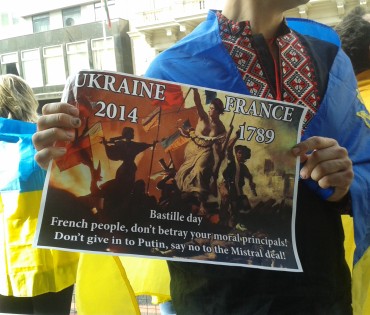An article written by Emmanuel Grynszpan, French journalist (La Tribune), based on the results of European thought leaders’ visit to Ukraine which was organized by the Institute of World Policy in partnership with CIDOB.The shorter version of this article was published on “Evropeiska Pravda” (in Ukrainian).
The views expressed in this article are the author’s own and do not necessarily reflect the views of the Institute of World Policy
Even today, links between France and Ukraine are not sufficient. (…)
Ukraine’s voice is hardly perceptible in the French media coverage hubbub. Kremlin’s voice is far reaching, whereas Kyiv’s voice is not. The lack of information about Ukraine leads to the fact that we understand more easily the Russian-Ukrainian conflict through the point of view of the Kremlin. Putin wants to widen his territory, his influence. But we do not clearly identify Kyiv’s objective. To risk a war so that one may join the European Union? It is hard to believe. Similarly, the French public does not take seriously the argument brought forth by some Ukrainian leaders that Ukraine is protecting Europe in holding back the Russian aggression. Frenchs perceive the Islamic States, terrorism and the wave of immigration as threats.
Putin has at his disposal many influential relays in the French media environment: intellectuals, politicians, and personalities from the arts. Moreover, Frenchs still retain admiration for General De Gaulle, who was considered as the Man of Providence because he was restoring France as a Great Power (France lost its position as a Great Power in 1939). This spirit of revenge, less virulent than in Russia, is defined by a profound anti-Americanism. Politicians use this anti-Americanism to proclaim their understanding of Putin, self-proclaimed leader of the resistance against U.S. hegemony movement.
The idea of giving Putin his claims in order to “have peace (and gas)” has taken root. Former president Nicolas Sarkozy, and now candidate to the 2017-presidential elections, has already legitimized Crimea annexation; Crimea “has chosen Russia”. Moreover, right and left of the French political spectrum frequently use the Russian theory that NATO has provoked and humiliated Putin. (…) The leader of the far-right party Marine le Pen, whose party represents 40% of the French political electorate, show her total support to Putin.
However, French are far from being charmed by Putin, his image is globally negative. The Russian leader is perceived has an autocrat with violent methods. Those who set democratic values and human rights higher than will to power have a bad opinion of Putin and his actions. Many intellectual and influential journalists criticize Putin’s authoritarianism and they see in his governing a return to totalitarianism. (…)
Nonetheless, one should never under-estimate intellectual laziness. The Russian-Ukrainian conflict is complex and his historical roots go back in time. The hybrid and undeclared war lead by Moscow, Donbas’ particularism – exploited by The Party of Region-, the rule of the Oligarchy over the policy; all these exotic elements make the conflict difficult for Western Europeans to understand.
However, Kremlin’ explanations easily simplify the conflict: Ukraine is oppressing the Russian-speaking minority, there is a resurgence of Ukrainian fascism opposing the counterattack of the heirs of the Red Army, the civil war is lead by the governmental troops against insurgent groups supported by the population, etc..
The propaganda is operating because it makes the reality more understandable. Russian public believes in it as its motherland is portrayed in a positive light, European public succumb to this logical and easy explanation of the events. Acquisition of knowledge requires efforts; therefore humans often prefer to believe. (…)
Nonetheless, an event is in favour of Ukraine: Maidan. (…) French identify themselves with protestors on Maidan. Russian propaganda, assimilating the revolution to US backed-up action, does not take roots in French minds. However, French press mixes up ethic nationalism and territorial nationalism, therefore Pravy sector was many times depicted as a neo-Nazi party, in compliance with Russian narrative.
On the other hand, it is clear for everybody that the Kremlin wants Kyiv back in its sphere of influence. Since there is no shelling anymore in Ukraine (at least in the media), the economic dimension of the conflict goes first. Ukraine appears as being more a problem than an opportunity. Because of the crisis, France has now two Mistral battleships pending. (…) Moreover, the EU has to face the debt crisis in Greece. Ukraine has to purify its economy first and engage in dolorous reforms, for the rest, we will see.
(…)
Kyiv cannot afford to wait to implement the reforms, which are politically risky and whose dividends will be visible only in medium-term. (…)
Meanwhile, a remodelling of Kyiv’s strategy towards the Donbas will improve Ukraine’s Western audience’s image. In fact many in France believe that Kyiv should cease to consider Donbas’s population as hostile and to engage direct dialogue with it on order to win the humanitarian envoys competition. Right now, Russia is ahead in the race, followed by Rinat Akhmetov, whereas Kyiv appears to be starving Donbas.
The initiative was implemented due to the support:
“Ukraine National Initiatives to Enhance Reforms” (UNITER) project, funded by the U.S. Agency for International Development (USAID) and implemented by the Pact in Ukraine;
Friedrich Ebert Foundation in Ukraine;
“Initiative on the think tanks development in Ukraine”, operated by International Renaissance Foundation in partnership with the Think Tank Fund (TTF) and funded by the Embassy of Sweden in Ukraine (SIDA).




Comments theme
Comments themeComments themeComments themeComments themeComments themeComments themeComments themeComments themeComments themeComments themeComments themeComments themeComments themeComments themeComments themeComments themeComments themeComments themeComments themeComments.